Analysis of Legislative Requirements in Supply Contracts Report
VerifiedAdded on 2020/01/07
|7
|2206
|308
Report
AI Summary
This report examines the role of supply contracts in business, focusing on a case study involving the Inner City hotel and its suppliers. It explores legislative requirements under supply contracts, including the Sales of Goods Act of 1979, and the importance of establishing positive business relationships with suppliers. The report covers elements of a valid contract, the responsibilities of suppliers, and the rights of buyers. It also discusses distribution channels, negotiation strategies, exclusion clauses, and the roles of legal and financial advisors in contract-related issues. The report concludes with an analysis of liability in cases of contract breaches and insolvency.
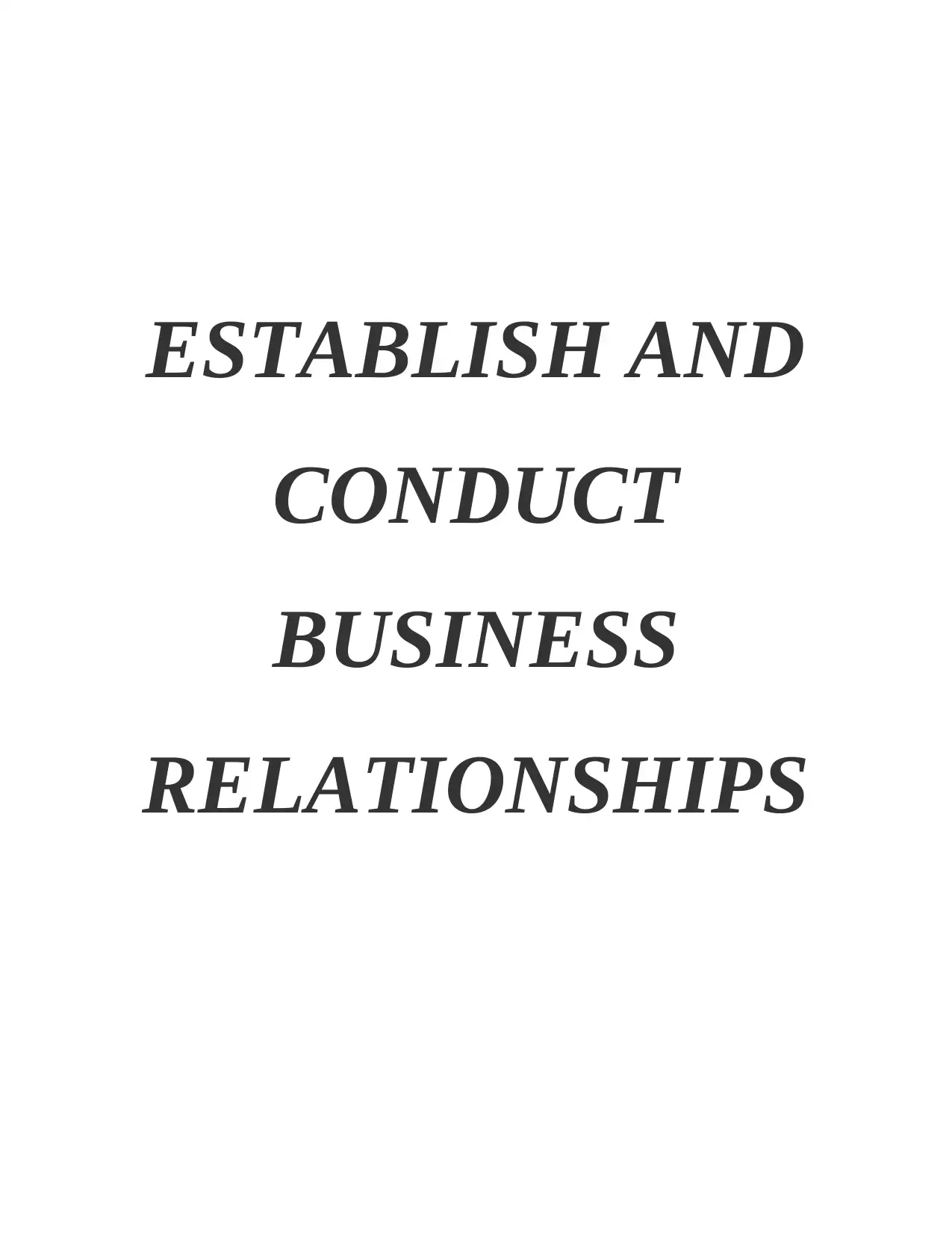
ESTABLISH AND
CONDUCT
BUSINESS
RELATIONSHIPS
CONDUCT
BUSINESS
RELATIONSHIPS
Paraphrase This Document
Need a fresh take? Get an instant paraphrase of this document with our AI Paraphraser
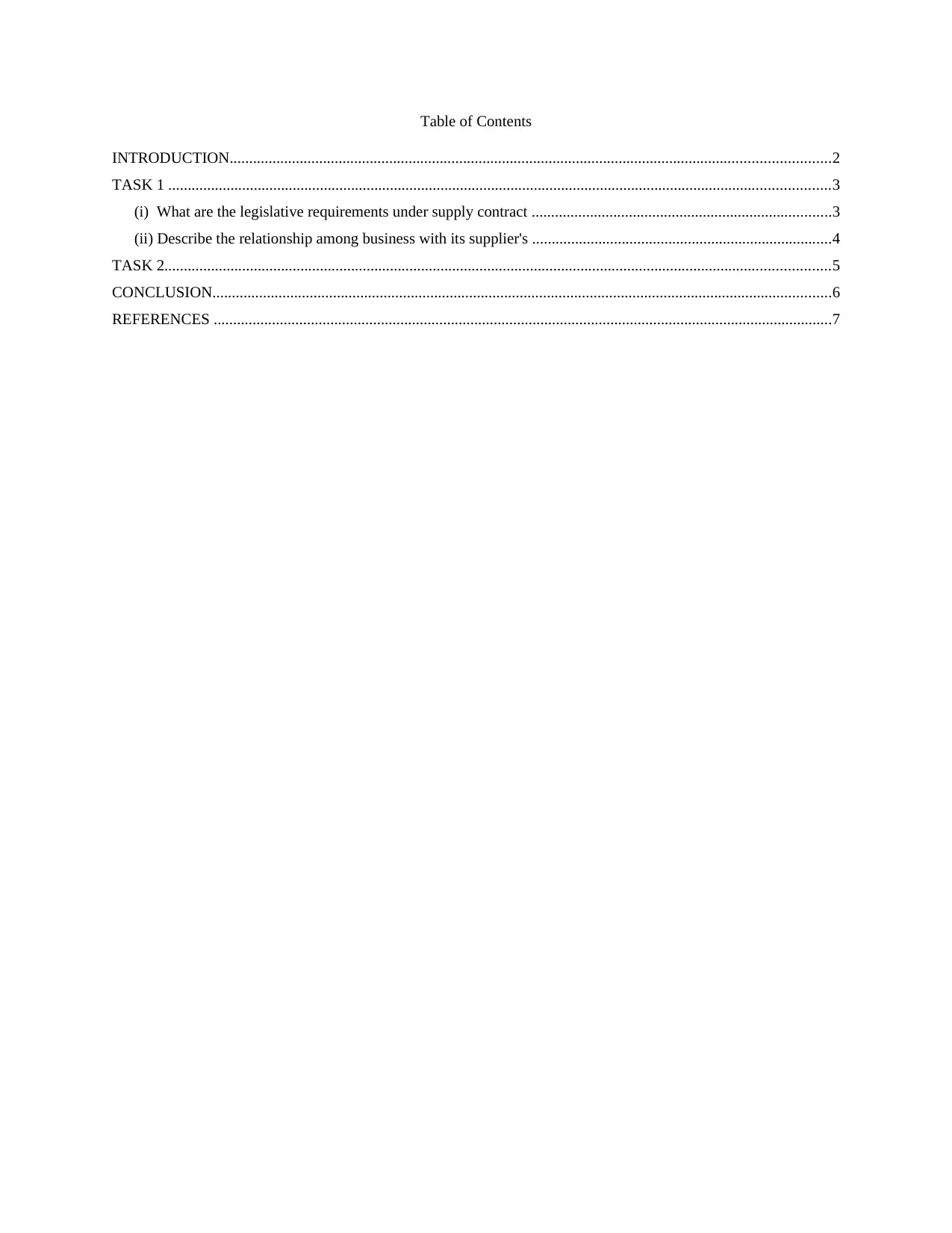
Table of Contents
INTRODUCTION..........................................................................................................................................................2
TASK 1 ..........................................................................................................................................................................3
(i) What are the legislative requirements under supply contract .............................................................................3
(ii) Describe the relationship among business with its supplier's .............................................................................4
TASK 2...........................................................................................................................................................................5
CONCLUSION...............................................................................................................................................................6
REFERENCES ...............................................................................................................................................................7
INTRODUCTION..........................................................................................................................................................2
TASK 1 ..........................................................................................................................................................................3
(i) What are the legislative requirements under supply contract .............................................................................3
(ii) Describe the relationship among business with its supplier's .............................................................................4
TASK 2...........................................................................................................................................................................5
CONCLUSION...............................................................................................................................................................6
REFERENCES ...............................................................................................................................................................7
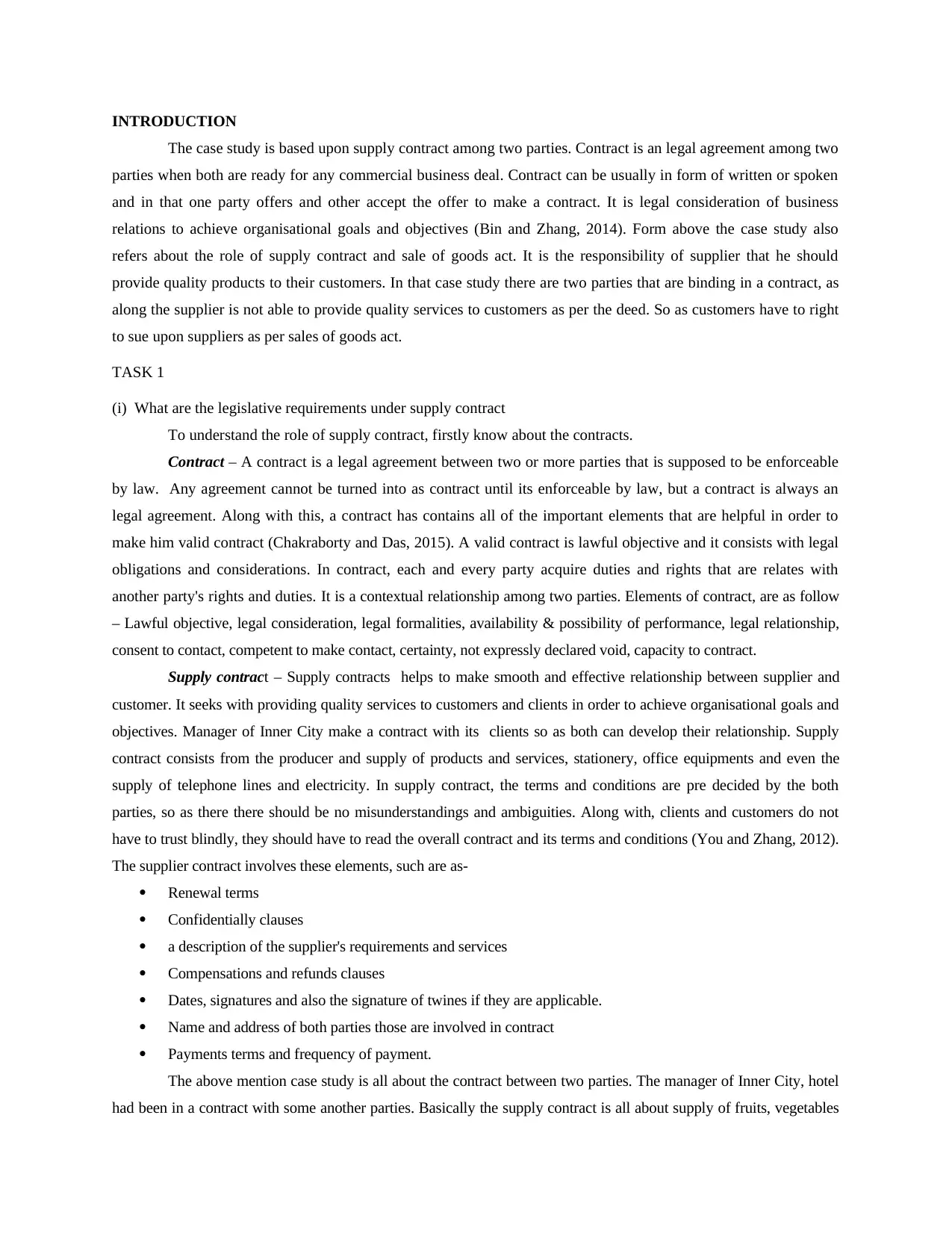
INTRODUCTION
The case study is based upon supply contract among two parties. Contract is an legal agreement among two
parties when both are ready for any commercial business deal. Contract can be usually in form of written or spoken
and in that one party offers and other accept the offer to make a contract. It is legal consideration of business
relations to achieve organisational goals and objectives (Bin and Zhang, 2014). Form above the case study also
refers about the role of supply contract and sale of goods act. It is the responsibility of supplier that he should
provide quality products to their customers. In that case study there are two parties that are binding in a contract, as
along the supplier is not able to provide quality services to customers as per the deed. So as customers have to right
to sue upon suppliers as per sales of goods act.
TASK 1
(i) What are the legislative requirements under supply contract
To understand the role of supply contract, firstly know about the contracts.
Contract – A contract is a legal agreement between two or more parties that is supposed to be enforceable
by law. Any agreement cannot be turned into as contract until its enforceable by law, but a contract is always an
legal agreement. Along with this, a contract has contains all of the important elements that are helpful in order to
make him valid contract (Chakraborty and Das, 2015). A valid contract is lawful objective and it consists with legal
obligations and considerations. In contract, each and every party acquire duties and rights that are relates with
another party's rights and duties. It is a contextual relationship among two parties. Elements of contract, are as follow
– Lawful objective, legal consideration, legal formalities, availability & possibility of performance, legal relationship,
consent to contact, competent to make contact, certainty, not expressly declared void, capacity to contract.
Supply contract – Supply contracts helps to make smooth and effective relationship between supplier and
customer. It seeks with providing quality services to customers and clients in order to achieve organisational goals and
objectives. Manager of Inner City make a contract with its clients so as both can develop their relationship. Supply
contract consists from the producer and supply of products and services, stationery, office equipments and even the
supply of telephone lines and electricity. In supply contract, the terms and conditions are pre decided by the both
parties, so as there there should be no misunderstandings and ambiguities. Along with, clients and customers do not
have to trust blindly, they should have to read the overall contract and its terms and conditions (You and Zhang, 2012).
The supplier contract involves these elements, such are as-
Renewal terms
Confidentially clauses
a description of the supplier's requirements and services
Compensations and refunds clauses
Dates, signatures and also the signature of twines if they are applicable.
Name and address of both parties those are involved in contract
Payments terms and frequency of payment.
The above mention case study is all about the contract between two parties. The manager of Inner City, hotel
had been in a contract with some another parties. Basically the supply contract is all about supply of fruits, vegetables
The case study is based upon supply contract among two parties. Contract is an legal agreement among two
parties when both are ready for any commercial business deal. Contract can be usually in form of written or spoken
and in that one party offers and other accept the offer to make a contract. It is legal consideration of business
relations to achieve organisational goals and objectives (Bin and Zhang, 2014). Form above the case study also
refers about the role of supply contract and sale of goods act. It is the responsibility of supplier that he should
provide quality products to their customers. In that case study there are two parties that are binding in a contract, as
along the supplier is not able to provide quality services to customers as per the deed. So as customers have to right
to sue upon suppliers as per sales of goods act.
TASK 1
(i) What are the legislative requirements under supply contract
To understand the role of supply contract, firstly know about the contracts.
Contract – A contract is a legal agreement between two or more parties that is supposed to be enforceable
by law. Any agreement cannot be turned into as contract until its enforceable by law, but a contract is always an
legal agreement. Along with this, a contract has contains all of the important elements that are helpful in order to
make him valid contract (Chakraborty and Das, 2015). A valid contract is lawful objective and it consists with legal
obligations and considerations. In contract, each and every party acquire duties and rights that are relates with
another party's rights and duties. It is a contextual relationship among two parties. Elements of contract, are as follow
– Lawful objective, legal consideration, legal formalities, availability & possibility of performance, legal relationship,
consent to contact, competent to make contact, certainty, not expressly declared void, capacity to contract.
Supply contract – Supply contracts helps to make smooth and effective relationship between supplier and
customer. It seeks with providing quality services to customers and clients in order to achieve organisational goals and
objectives. Manager of Inner City make a contract with its clients so as both can develop their relationship. Supply
contract consists from the producer and supply of products and services, stationery, office equipments and even the
supply of telephone lines and electricity. In supply contract, the terms and conditions are pre decided by the both
parties, so as there there should be no misunderstandings and ambiguities. Along with, clients and customers do not
have to trust blindly, they should have to read the overall contract and its terms and conditions (You and Zhang, 2012).
The supplier contract involves these elements, such are as-
Renewal terms
Confidentially clauses
a description of the supplier's requirements and services
Compensations and refunds clauses
Dates, signatures and also the signature of twines if they are applicable.
Name and address of both parties those are involved in contract
Payments terms and frequency of payment.
The above mention case study is all about the contract between two parties. The manager of Inner City, hotel
had been in a contract with some another parties. Basically the supply contract is all about supply of fruits, vegetables
⊘ This is a preview!⊘
Do you want full access?
Subscribe today to unlock all pages.

Trusted by 1+ million students worldwide
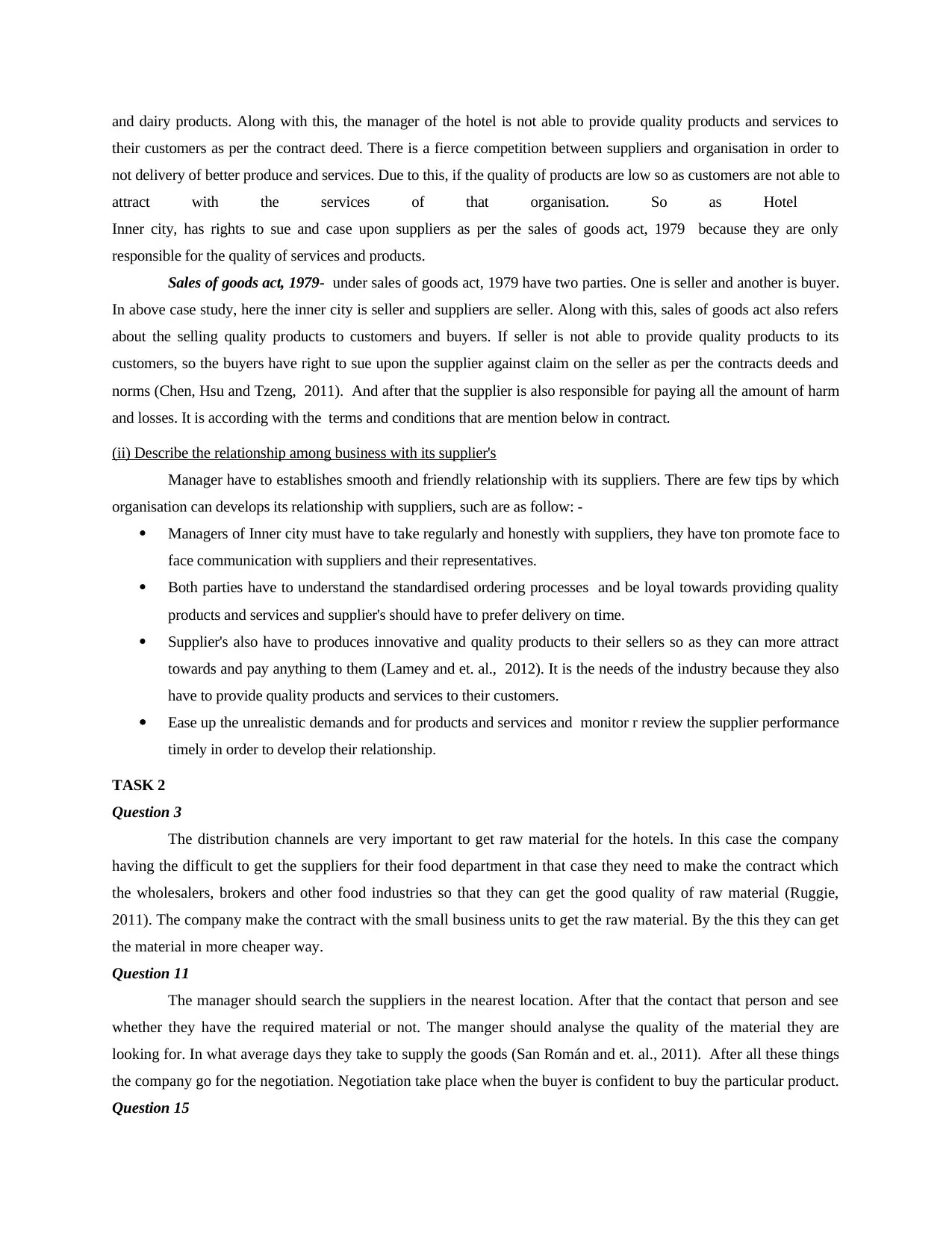
and dairy products. Along with this, the manager of the hotel is not able to provide quality products and services to
their customers as per the contract deed. There is a fierce competition between suppliers and organisation in order to
not delivery of better produce and services. Due to this, if the quality of products are low so as customers are not able to
attract with the services of that organisation. So as Hotel
Inner city, has rights to sue and case upon suppliers as per the sales of goods act, 1979 because they are only
responsible for the quality of services and products.
Sales of goods act, 1979- under sales of goods act, 1979 have two parties. One is seller and another is buyer.
In above case study, here the inner city is seller and suppliers are seller. Along with this, sales of goods act also refers
about the selling quality products to customers and buyers. If seller is not able to provide quality products to its
customers, so the buyers have right to sue upon the supplier against claim on the seller as per the contracts deeds and
norms (Chen, Hsu and Tzeng, 2011). And after that the supplier is also responsible for paying all the amount of harm
and losses. It is according with the terms and conditions that are mention below in contract.
(ii) Describe the relationship among business with its supplier's
Manager have to establishes smooth and friendly relationship with its suppliers. There are few tips by which
organisation can develops its relationship with suppliers, such are as follow: -
Managers of Inner city must have to take regularly and honestly with suppliers, they have ton promote face to
face communication with suppliers and their representatives.
Both parties have to understand the standardised ordering processes and be loyal towards providing quality
products and services and supplier's should have to prefer delivery on time.
Supplier's also have to produces innovative and quality products to their sellers so as they can more attract
towards and pay anything to them (Lamey and et. al., 2012). It is the needs of the industry because they also
have to provide quality products and services to their customers.
Ease up the unrealistic demands and for products and services and monitor r review the supplier performance
timely in order to develop their relationship.
TASK 2
Question 3
The distribution channels are very important to get raw material for the hotels. In this case the company
having the difficult to get the suppliers for their food department in that case they need to make the contract which
the wholesalers, brokers and other food industries so that they can get the good quality of raw material (Ruggie,
2011). The company make the contract with the small business units to get the raw material. By the this they can get
the material in more cheaper way.
Question 11
The manager should search the suppliers in the nearest location. After that the contact that person and see
whether they have the required material or not. The manger should analyse the quality of the material they are
looking for. In what average days they take to supply the goods (San Román and et. al., 2011). After all these things
the company go for the negotiation. Negotiation take place when the buyer is confident to buy the particular product.
Question 15
their customers as per the contract deed. There is a fierce competition between suppliers and organisation in order to
not delivery of better produce and services. Due to this, if the quality of products are low so as customers are not able to
attract with the services of that organisation. So as Hotel
Inner city, has rights to sue and case upon suppliers as per the sales of goods act, 1979 because they are only
responsible for the quality of services and products.
Sales of goods act, 1979- under sales of goods act, 1979 have two parties. One is seller and another is buyer.
In above case study, here the inner city is seller and suppliers are seller. Along with this, sales of goods act also refers
about the selling quality products to customers and buyers. If seller is not able to provide quality products to its
customers, so the buyers have right to sue upon the supplier against claim on the seller as per the contracts deeds and
norms (Chen, Hsu and Tzeng, 2011). And after that the supplier is also responsible for paying all the amount of harm
and losses. It is according with the terms and conditions that are mention below in contract.
(ii) Describe the relationship among business with its supplier's
Manager have to establishes smooth and friendly relationship with its suppliers. There are few tips by which
organisation can develops its relationship with suppliers, such are as follow: -
Managers of Inner city must have to take regularly and honestly with suppliers, they have ton promote face to
face communication with suppliers and their representatives.
Both parties have to understand the standardised ordering processes and be loyal towards providing quality
products and services and supplier's should have to prefer delivery on time.
Supplier's also have to produces innovative and quality products to their sellers so as they can more attract
towards and pay anything to them (Lamey and et. al., 2012). It is the needs of the industry because they also
have to provide quality products and services to their customers.
Ease up the unrealistic demands and for products and services and monitor r review the supplier performance
timely in order to develop their relationship.
TASK 2
Question 3
The distribution channels are very important to get raw material for the hotels. In this case the company
having the difficult to get the suppliers for their food department in that case they need to make the contract which
the wholesalers, brokers and other food industries so that they can get the good quality of raw material (Ruggie,
2011). The company make the contract with the small business units to get the raw material. By the this they can get
the material in more cheaper way.
Question 11
The manager should search the suppliers in the nearest location. After that the contact that person and see
whether they have the required material or not. The manger should analyse the quality of the material they are
looking for. In what average days they take to supply the goods (San Román and et. al., 2011). After all these things
the company go for the negotiation. Negotiation take place when the buyer is confident to buy the particular product.
Question 15
Paraphrase This Document
Need a fresh take? Get an instant paraphrase of this document with our AI Paraphraser
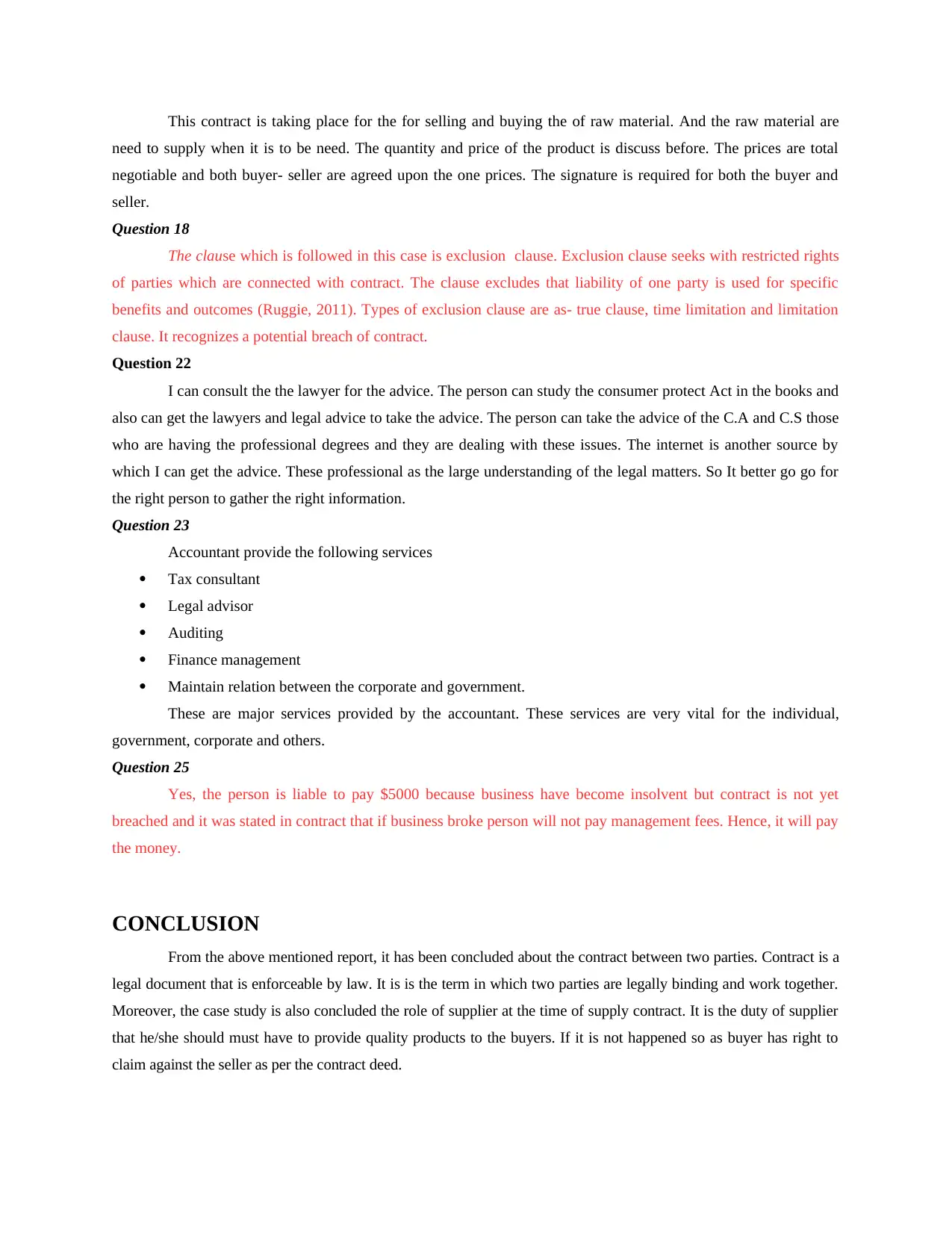
This contract is taking place for the for selling and buying the of raw material. And the raw material are
need to supply when it is to be need. The quantity and price of the product is discuss before. The prices are total
negotiable and both buyer- seller are agreed upon the one prices. The signature is required for both the buyer and
seller.
Question 18
The clause which is followed in this case is exclusion clause. Exclusion clause seeks with restricted rights
of parties which are connected with contract. The clause excludes that liability of one party is used for specific
benefits and outcomes (Ruggie, 2011). Types of exclusion clause are as- true clause, time limitation and limitation
clause. It recognizes a potential breach of contract.
Question 22
I can consult the the lawyer for the advice. The person can study the consumer protect Act in the books and
also can get the lawyers and legal advice to take the advice. The person can take the advice of the C.A and C.S those
who are having the professional degrees and they are dealing with these issues. The internet is another source by
which I can get the advice. These professional as the large understanding of the legal matters. So It better go go for
the right person to gather the right information.
Question 23
Accountant provide the following services
Tax consultant
Legal advisor
Auditing
Finance management
Maintain relation between the corporate and government.
These are major services provided by the accountant. These services are very vital for the individual,
government, corporate and others.
Question 25
Yes, the person is liable to pay $5000 because business have become insolvent but contract is not yet
breached and it was stated in contract that if business broke person will not pay management fees. Hence, it will pay
the money.
CONCLUSION
From the above mentioned report, it has been concluded about the contract between two parties. Contract is a
legal document that is enforceable by law. It is is the term in which two parties are legally binding and work together.
Moreover, the case study is also concluded the role of supplier at the time of supply contract. It is the duty of supplier
that he/she should must have to provide quality products to the buyers. If it is not happened so as buyer has right to
claim against the seller as per the contract deed.
need to supply when it is to be need. The quantity and price of the product is discuss before. The prices are total
negotiable and both buyer- seller are agreed upon the one prices. The signature is required for both the buyer and
seller.
Question 18
The clause which is followed in this case is exclusion clause. Exclusion clause seeks with restricted rights
of parties which are connected with contract. The clause excludes that liability of one party is used for specific
benefits and outcomes (Ruggie, 2011). Types of exclusion clause are as- true clause, time limitation and limitation
clause. It recognizes a potential breach of contract.
Question 22
I can consult the the lawyer for the advice. The person can study the consumer protect Act in the books and
also can get the lawyers and legal advice to take the advice. The person can take the advice of the C.A and C.S those
who are having the professional degrees and they are dealing with these issues. The internet is another source by
which I can get the advice. These professional as the large understanding of the legal matters. So It better go go for
the right person to gather the right information.
Question 23
Accountant provide the following services
Tax consultant
Legal advisor
Auditing
Finance management
Maintain relation between the corporate and government.
These are major services provided by the accountant. These services are very vital for the individual,
government, corporate and others.
Question 25
Yes, the person is liable to pay $5000 because business have become insolvent but contract is not yet
breached and it was stated in contract that if business broke person will not pay management fees. Hence, it will pay
the money.
CONCLUSION
From the above mentioned report, it has been concluded about the contract between two parties. Contract is a
legal document that is enforceable by law. It is is the term in which two parties are legally binding and work together.
Moreover, the case study is also concluded the role of supplier at the time of supply contract. It is the duty of supplier
that he/she should must have to provide quality products to the buyers. If it is not happened so as buyer has right to
claim against the seller as per the contract deed.
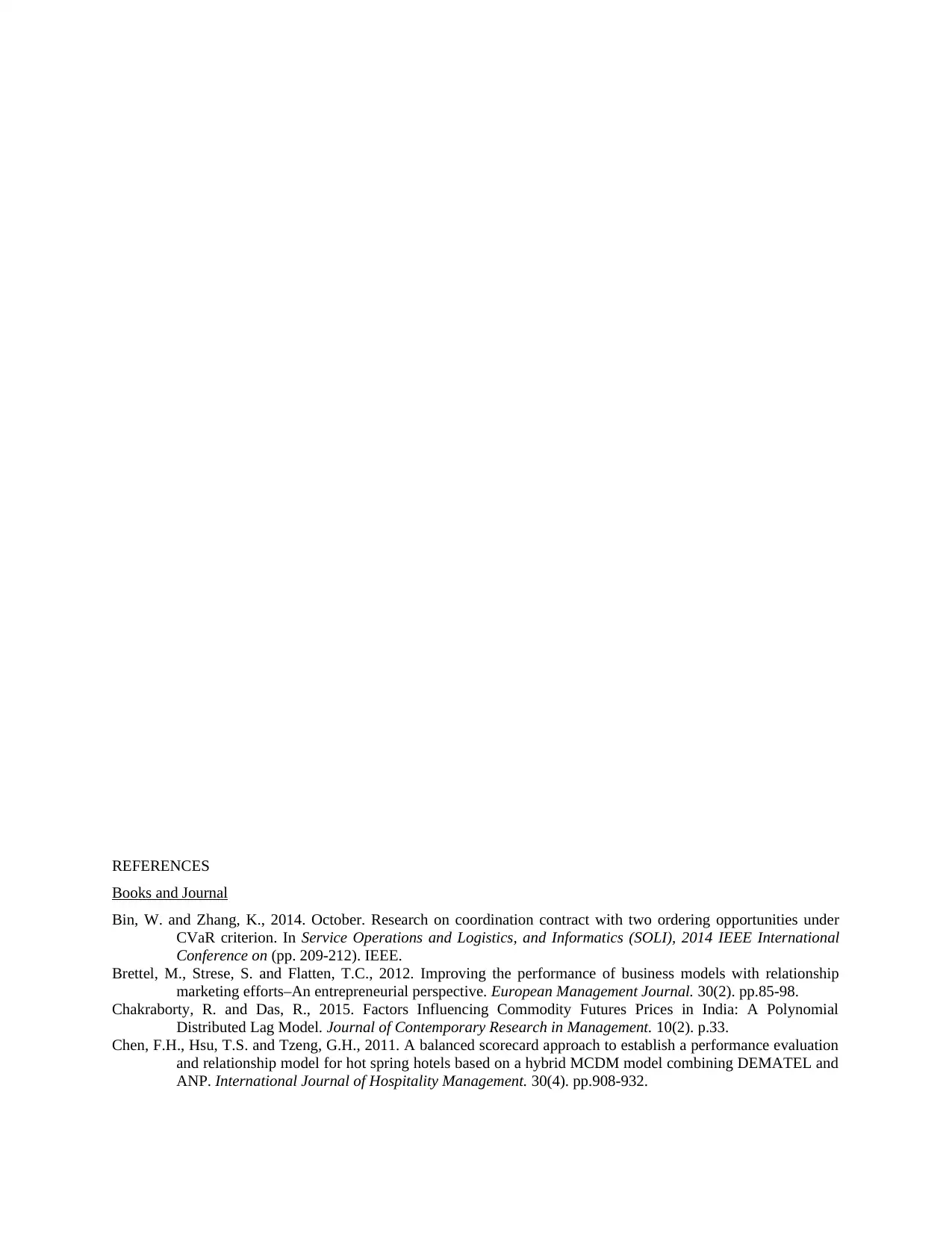
REFERENCES
Books and Journal
Bin, W. and Zhang, K., 2014. October. Research on coordination contract with two ordering opportunities under
CVaR criterion. In Service Operations and Logistics, and Informatics (SOLI), 2014 IEEE International
Conference on (pp. 209-212). IEEE.
Brettel, M., Strese, S. and Flatten, T.C., 2012. Improving the performance of business models with relationship
marketing efforts–An entrepreneurial perspective. European Management Journal. 30(2). pp.85-98.
Chakraborty, R. and Das, R., 2015. Factors Influencing Commodity Futures Prices in India: A Polynomial
Distributed Lag Model. Journal of Contemporary Research in Management. 10(2). p.33.
Chen, F.H., Hsu, T.S. and Tzeng, G.H., 2011. A balanced scorecard approach to establish a performance evaluation
and relationship model for hot spring hotels based on a hybrid MCDM model combining DEMATEL and
ANP. International Journal of Hospitality Management. 30(4). pp.908-932.
Books and Journal
Bin, W. and Zhang, K., 2014. October. Research on coordination contract with two ordering opportunities under
CVaR criterion. In Service Operations and Logistics, and Informatics (SOLI), 2014 IEEE International
Conference on (pp. 209-212). IEEE.
Brettel, M., Strese, S. and Flatten, T.C., 2012. Improving the performance of business models with relationship
marketing efforts–An entrepreneurial perspective. European Management Journal. 30(2). pp.85-98.
Chakraborty, R. and Das, R., 2015. Factors Influencing Commodity Futures Prices in India: A Polynomial
Distributed Lag Model. Journal of Contemporary Research in Management. 10(2). p.33.
Chen, F.H., Hsu, T.S. and Tzeng, G.H., 2011. A balanced scorecard approach to establish a performance evaluation
and relationship model for hot spring hotels based on a hybrid MCDM model combining DEMATEL and
ANP. International Journal of Hospitality Management. 30(4). pp.908-932.
⊘ This is a preview!⊘
Do you want full access?
Subscribe today to unlock all pages.

Trusted by 1+ million students worldwide
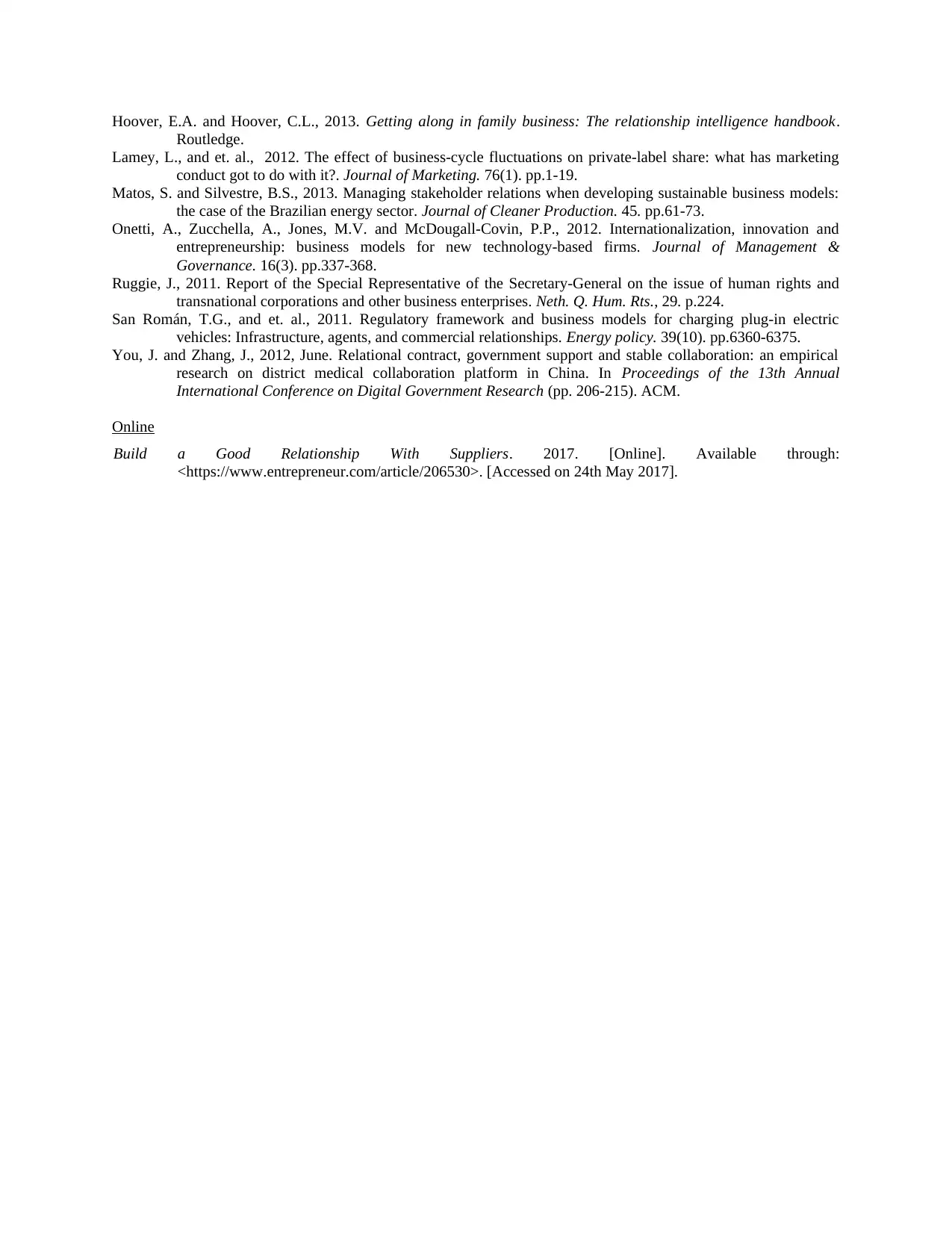
Hoover, E.A. and Hoover, C.L., 2013. Getting along in family business: The relationship intelligence handbook.
Routledge.
Lamey, L., and et. al., 2012. The effect of business-cycle fluctuations on private-label share: what has marketing
conduct got to do with it?. Journal of Marketing. 76(1). pp.1-19.
Matos, S. and Silvestre, B.S., 2013. Managing stakeholder relations when developing sustainable business models:
the case of the Brazilian energy sector. Journal of Cleaner Production. 45. pp.61-73.
Onetti, A., Zucchella, A., Jones, M.V. and McDougall-Covin, P.P., 2012. Internationalization, innovation and
entrepreneurship: business models for new technology-based firms. Journal of Management &
Governance. 16(3). pp.337-368.
Ruggie, J., 2011. Report of the Special Representative of the Secretary-General on the issue of human rights and
transnational corporations and other business enterprises. Neth. Q. Hum. Rts., 29. p.224.
San Román, T.G., and et. al., 2011. Regulatory framework and business models for charging plug-in electric
vehicles: Infrastructure, agents, and commercial relationships. Energy policy. 39(10). pp.6360-6375.
You, J. and Zhang, J., 2012, June. Relational contract, government support and stable collaboration: an empirical
research on district medical collaboration platform in China. In Proceedings of the 13th Annual
International Conference on Digital Government Research (pp. 206-215). ACM.
Online
Build a Good Relationship With Suppliers. 2017. [Online]. Available through:
<https://www.entrepreneur.com/article/206530>. [Accessed on 24th May 2017].
Routledge.
Lamey, L., and et. al., 2012. The effect of business-cycle fluctuations on private-label share: what has marketing
conduct got to do with it?. Journal of Marketing. 76(1). pp.1-19.
Matos, S. and Silvestre, B.S., 2013. Managing stakeholder relations when developing sustainable business models:
the case of the Brazilian energy sector. Journal of Cleaner Production. 45. pp.61-73.
Onetti, A., Zucchella, A., Jones, M.V. and McDougall-Covin, P.P., 2012. Internationalization, innovation and
entrepreneurship: business models for new technology-based firms. Journal of Management &
Governance. 16(3). pp.337-368.
Ruggie, J., 2011. Report of the Special Representative of the Secretary-General on the issue of human rights and
transnational corporations and other business enterprises. Neth. Q. Hum. Rts., 29. p.224.
San Román, T.G., and et. al., 2011. Regulatory framework and business models for charging plug-in electric
vehicles: Infrastructure, agents, and commercial relationships. Energy policy. 39(10). pp.6360-6375.
You, J. and Zhang, J., 2012, June. Relational contract, government support and stable collaboration: an empirical
research on district medical collaboration platform in China. In Proceedings of the 13th Annual
International Conference on Digital Government Research (pp. 206-215). ACM.
Online
Build a Good Relationship With Suppliers. 2017. [Online]. Available through:
<https://www.entrepreneur.com/article/206530>. [Accessed on 24th May 2017].
1 out of 7
Related Documents
Your All-in-One AI-Powered Toolkit for Academic Success.
+13062052269
info@desklib.com
Available 24*7 on WhatsApp / Email
![[object Object]](/_next/static/media/star-bottom.7253800d.svg)
Unlock your academic potential
Copyright © 2020–2026 A2Z Services. All Rights Reserved. Developed and managed by ZUCOL.





